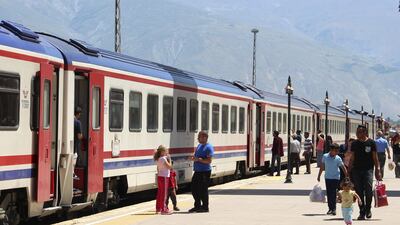Settling into my business class seat in Istanbul on the recently opened, high-speed train to Ankara, the notion that I'm about to experience a slice of president Recep Tayyip Erdogan's vaunted "New Turkey" quickly fades.
As soon as my phone connects to the on-board Wi-Fi, it drops again, and the complementary coffee handed out to us high-flyers would embarrass any budget airline. An 8-inch screen embedded in the seat in front is showing the Oscar-winning silent film, The Artist, but its intertitles are in Turkish. Topping it all off, a large yellow streak across my window renders futile attempts to photograph the passing Marmara Sea shoreline.
Not to worry: I've started out on the 35-hour journey across Anatolia to the eastern city of Kars, and, over the 1,720-kilometre trip, there will be plenty of opportunities ahead.
We leave Pendik station in west Istanbul before 9am, and are soon breezing through the city's seemingly endless suburbs at a haltered 100kph. The 5-year-old in me is deeply disappointed – bullet train this is not. But once east and south of the gulf of Izmit and into Anatolia proper, we're steaming along at 250kph past orchards and holiday homes. The landscape is lush and green, and it all passes in a blur.
By lunchtime, we roll into Ankara's gleaming and mostly empty new €215 million (Dh943m) train station. Four hours later, I'm sitting on seat 49 in wagon six on the 18:00 Dogu Ekspresi (Eastern Express) to Kars, set for stage two of a trip across a country almost as large as France, Portugal and Austria combined.
Once on board, the novelty wears off and a momentary dread sets in. The romantic visions of the trip I had conjured up back in my Istanbul apartment – staring out an open window across the landscape, wind in my hair, cigarette in hand – are replaced with reality: the toilet is pretty much unusable and smoking on board is prohibited.
As becomes more obvious the further we journey east, the mighty Western Euphrates river is a cornerstone of rural Anatolian life, as it has been for millennia. The ruling AK Party's programme of hydroelectric dam projects, however, has taken the use of rivers to the next level. From my window, I can see submerged houses and trout trapped in pools between dam systems. But the dams provide jobs and a dependable source of water for thousands of farmers.
__________________
Read more:
Top 5 new World Heritage Sites to visit in 2017
The Turkish art that was lost in translation
Once upon a time in Anatolia: a photo exhibition from archaeologist John Garstang
__________________
At Mercan in Erzincan province we leave the Euphrates behind. Our train heads north along the Karasu river before relentlessly chugging east into eastern Anatolia's high, open plains.
The train offers a glimpse of a world we don't commonly get to see. Unlike road travel, trains pass behind back gardens and yards, places that make up a central aspect of people's private lives. I see the delighted faces of two dogs, whose master is about to place their food bowls down in front of them. There are the families picnicking peacefully on the shores of the Red river. When I momentarily catch sight of a young man dressed in a navy suit, ambling along in a cab-less tractor in the direction of town, images of the day ahead he has planned enter my thoughts.
Inside the train there is much activity, too. It's Eid, and the giddiness that accompanies all holidays is thick in the air as families gather in the food wagon for breakfast. One carriage back, I'm sharing a couchette compartment with two gold miners and an elderly man – referred to as hacibaba – whose name is Ahmet Ozkaya. The miners are headed back east following a short holiday spent with family in Ankara, and are decidedly downbeat.
Throughout the journey, hacibaba fishes through his huge suitcase for tissues, tea glasses and a large bottle of Turkey's equivalent of Fanta. Every now and then his wife arrives and orders him to the toilet. As we approach their destination, the nondescript town of Pasinler in Erzurum province, hacibaba asks me to carry his chock-full suitcase off the train. I tell him I'm headed to Kars and we say our farewells.
We pass the remains of long-since abandoned Armenian hamlets, visible only by red-stained grass and soil, and crumbling rocks. Here, when invading Mongol armies swept in from the east, villagers would escape to the mountains or to caves dug out of river banks to hide.
Stephen Starr is a journalist and author who has lived in Syria and Turkey since 2007

